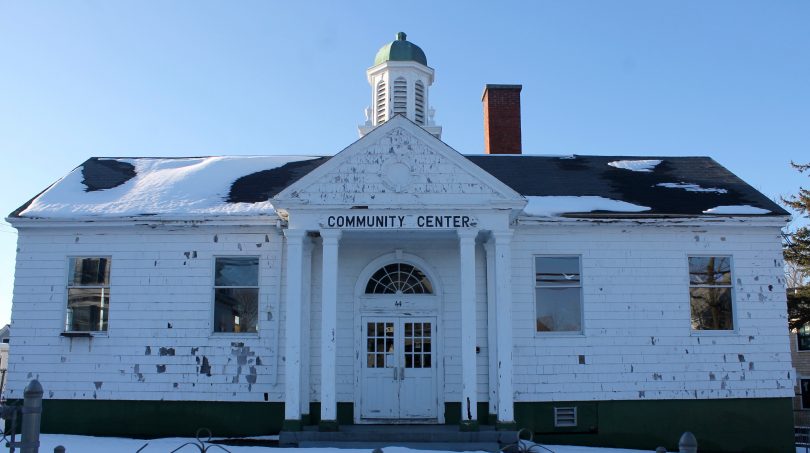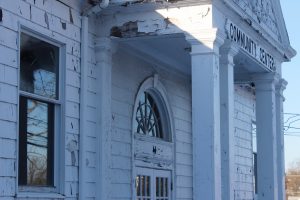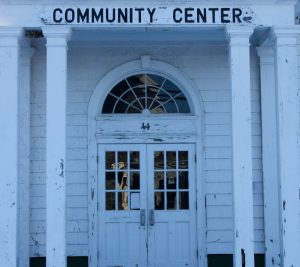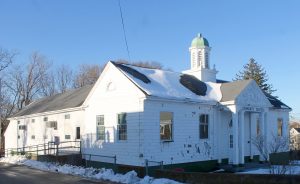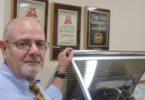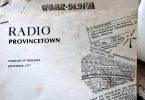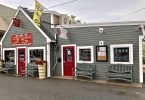PROVINCETOWN – “The bones of the building are solid as a rock,” said Mark Hatch, treasurer of a group planning to transform the Provincetown Community Center, closed for four years, into a new arts & innovation center that will be called Provincetown Commons.
Bones? This is about the planning of a heart transplant.
While the old building needs a new roof and some windows, as well as general TLC, the plan by the upstart non-profit is to revive the building on Bradford Street as a “nexus” for community and collaboration, said Karen Cappotto, an artist and co-founder with Hatch of Provincetown Commons.
“When we meet other people doing interesting things, it’s not just one hot burning coal. Put one more than one together and it creates more heat.” – Artist Karen Cappotto, co-founder of Provincetown Commons
“When we meet other people doing interesting things, it’s not just one hot burning coal. Put one more than one together and it creates more heat,” said Cappotto.
“It’s a candle in the window,” said Town Manager David Panagore. “It’s a warm place in the winter. It’s place for like-minded people working on similar activities to gather.”
That is the dream. But it is the facts on the ground right now that made this whole idea appear.
“When I am in town, i drive by it every day either on my bike or in my car,” said Terrence Meck, co-founder and president of the Palette Fund, which has pledged up to $250,000 for the project. “It’s an eye-sore with those big words, ‘Community Center’ on the front of it.”
Cappotto is an artist who “reluctantly” serves on the town’s economic development committee. One day, she wandered into Hatch’s store, The Artist’s Loft. Hatch is on the town finance committee.
“Somehow, the conversation swung into year-round economic opportunity,” recalled Hatch. “She said, ‘We ought to do something about that community center.”
Hatch had an idea immediately. “I said, do you know how many artists come to me who would love to teach classes, or would love to have an event and don’t have any place to do it?”
The old community center, built in 1935 as the Governor Bradford School, closed in 2013. The activities that had been held at the community center moved to the Veteran’s Memorial School, whose classes moved to the High School, which had closed due to lack of students.
As the evolution of Provincetown continues, Hatch said that the town has lost 15 percent of its year round population since 2000. While many things and especially real estate factor into it, the trickle down, in effect, has left this building empty.
There have been previous plans to repurpose the empty building, but all have thus far fallen through. “It had several aborted attempts to sell it,” said Hatch. But, he said that the town required a deed restriction on the property. “The town didn’t want someone to turn around and develop it into six or seven $700,000 condos,” said Hatch.
It remained empty with those big words, “Community Center,” over the doorway.
Previous proposals included putting housing into the building, and an open-ended proposal with no specific plan other than to use the building, said Panagore. Neither turned out to be viable, he said.
When the town tried a third time to get proposals, Panagore said there was a new method to “maximize the number of responses.” Two came in, he said. One was for 78 beds of seasonal workforce housing, and the other was for Provincetown Commons.
As the town discussed what to do with the building, Panagore said, “A lot of people wanted it to have a community purpose. Whatever happened, it would somehow serve a community purpose.”
Meanwhile, that first conversation between Cappotto and Hatch occurred about seven months ago, said Cappotto. It all started to come together about two months ago, she said. “We have financial backing and legal help,” she said.
The town has agreed to a 99-year lease starting at $24,200 per year, and then inflation will factor in, said Panagore.
“This is a resounding yes,” said Cappotto. “We’ve got it out of the developer’s hands. I don’t think the town expected artists to submit such a professional and well-thought-out proposal.”
“It was a kick-ass proposal,” said Hatch. “There was a lot of support from local people.” People understood the need, he said.
“There are people starting businesses who want a little shared work space,” he said. If someone does not have their own office, Hatch noted, “There’s only so much business you can do in the Wired Puppy in the winter.”
“There’s a severe lack of space in town for the arts,” said Hatch. While arts is a big part of the tourism economy, Hatch said, “There’s been nothing really going on in an official capacity from the town’s point of view for the arts.”
Now there is a building – an actual place.
“The goal is to open the door on September 10,” said Hatch.
![]() The Palette Fund, And Community
The Palette Fund, And Community
With funding pledged from the Palette Fund and others, the dream is moving forward towards reality. “Everything we do, we really look at community working in collaboration,” said Meck. A lot of grants given by the Pallette Foundation, said Meck, are for “nonprofits working together.”
“Community is the key to living in a local peace economy,” said Meck. Given the current political climate, Meck said, “Community is going to be more important than ever.”
Since 2008, the Palette Fund has given $7.7 million in grants to more than 125 organizations, according to its website. The fund was launched in 2008 to honor Meck’s late husband, Rand Harlan Skolnick, who died of pancreatic cancer.
Meck, who recently moved the foundation office from New York to a building on Bradford Street, said he had been on something of “a listening tour” of the needs of Provincetown when he heard of Provincetown Commons.
“Eight artists brought this to my attention,” he said. “It’s amazing to see how they came together and put this proposal forward.”
As for the pledge of $250,000, Meck said, “There are other donors that are joining the foundation that aren’t making themselves public.”
The large building will be able to accommodate many things, said Hatch.
“We’re going to do rentals for space, as well as provide memberships,” said Hatch. “It shouldn’t really be expensive. It should go back to being a community center,” he said.
Upstairs, there are three classrooms, said Hatch. “It could easily be divided into studio space,” he said. “There’s a giant space on the first floor. It runs the entire length of the building. You could have dividers, like in Town Hall, that roll in and roll back out,” said Hatch.
The space on the first floor is “the only space in town that size. You could hold a dance class to a civic meeting, or even have 20 or 30 students in there with easels,” said Hatch.
One big need that will be met is for video production, said Hatch. There will be a focus on digital arts and “we’re hoping to build a state of the arts editing studio,” he said.
As for what exactly will happen, Hatch said, “We will take applications and see what the needs are. It’s not going to be, build it and they will come.”
“The timing is perfect for a place like this to exist,” said Meck. “Co-work spaces are popping up all over the country. They are hugely popular.” Meck talked about being creative people being inspired and “not just working alone in front of their computer at home.”
Provincetown Commons is not planned as just an arts center. It is an arts and innovation center. Provincetown is not Cambridge, which is fine, said Panagore. “You have to start where your strengths are,” he said.
In Provincetown, that might be described as “poetry to pottery” plus “someone working on software” and more, said Panagore.
“This is clearly entrepreneurially-led,” he said. But it is the art component that is really playing to the town’s strengths, he said.
“There are a lot of people that work remotely,” said Hatch. “There’s a lot of hidden talent in this town.”
One aspect of the project will be the offering of mentoring, said Hatch. “One of the really interesting things about Provincetown is how many business executives who have retired early live here,” he said.
Mixing artists, and entrepreneurs and mentors in one building can lead to great things, said Hatch. “You get to rub elbows with a lot of different people who have all kinds of different skills,” he said.
Cappotto said, “My hope with the whole project is that people will start to look at the provincetown brand and see all the talent that actually is here.”
Panagore said, “Provincetown is trying everything that it can. It’s being very creative in bringing more life, more vitality and more opportunity here.”
The extreme seasonal nature of the town makes such a project even more important, he said.
“During the summer, it’s you and 20,000 of your best friends on Commercial Street. When you have that as your reference point, you can certainly feel quite isolated in the winter.” – Provincetown Town Manager David Panagore
“During the summer, it’s you and 20,000 of your best friends on Commercial Street,” said Panagore. “When you have that as your reference point, you can certainly feel quite isolated in the winter,” he said.
With a dwindling year-round population and the tendency for artists to isolate themselves, this new project is expected to bring new life to those cold months, said Panagore.
Panagore said Provincetown Commons will be “one more beating heart, one more well-lit place where people can gather.”
– Please like us on Facebook.

